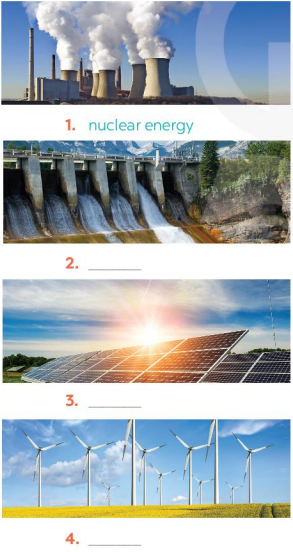Tiếng Anh 7 Unit 10 A Closer Look 1
1.Match the types of energy in A with the energy sources in B. 2. Write the phrases to label the pictures. 3.Complete the sentences with the words and phrases from 1 or 2. 4. Listen and repeat. Pay attention to the stressed syllables in the words. 5. Listen and repeat, paying attention to the stressed syllables in the underlined words.
Tổng hợp đề thi học kì 1 lớp 7 tất cả các môn - Kết nối tri thức
Toán - Văn - Anh - Khoa học tự nhiên...
Bài 1
Video hướng dẫn giải
Vocabulary
1. Match the types of energy in A with the energy sources in B.
(Nối các dạng năng lượng ở A với các nguồn năng lượng ở B.)
|
A |
B |
|
1. solar energy |
a. water |
|
2. wind energy |
b. nuclear |
|
3. hydro energy |
c. wind |
|
4. nuclear energy |
d. the sun |
Lời giải chi tiết:
|
1. d |
2. c |
3. a |
4. b |
1 - d: solar energy – the sun
(năng lượng mặt trời – mặt trời)
2 - c: wind energy – wind
(năng lượng gió – gió)
3 - a: hydro energy – water
(năng lượng thủy điện – nước)
4 - b: nuclear energy – nuclear
(năng lượng hạt nhân – hạt nhân nguyên tử)
Bài 2
Video hướng dẫn giải
2. Write the phrases to label the pictures.
(Viết các cụm từ để gắn nhãn các bức tranh.)

Lời giải chi tiết:
1. nuclear energy (năng lượng hạt nhân)
2. hydro energy (năng lượng thủy điện)
3. solar energy (năng lượng mặt trời)
4. wind energy (năng lượng gió)
Bài 3
Video hướng dẫn giải
3. Complete the sentences with the words and phrases from 1 or 2.
(Hoàn thành các câu với các từ và cụm từ trong bài 1 hoặc 2.)
1. A good place to change ________ to energy is near the sea because of the sea breezes.
2. They are putting solar panels on the roof of our building to produce ______.
3. When energy comes from __________, we call it hydro energy.
4. They are reducing the use of__________ because it is not safe to produce.
Lời giải chi tiết:
|
1. wind |
2. solar energy |
3. water |
4. nuclear energy |
1. A good place to change wind to energy is near the sea because of the sea breezes.
(Nơi tốt để đổi gió thành năng lượng là gần biển vì có gió biển.)
2. They are putting solar panels on the roof of our building to produce solar energy.
(Họ đang đặt các tấm pin mặt trời trên nóc tòa nhà của chúng tôi để sản xuất năng lượng mặt trời.)
3. When energy comes from water, we call it hydro energy.
(Khi năng lượng đến từ nước, chúng ta gọi nó là năng lượng thủy.)
4. They are reducing the use of nuclear energy because it is not safe to produce.
(Họ đang giảm sử dụng năng lượng hạt nhân vì nó không an toàn để sản xuất.)
Bài 4
Video hướng dẫn giải
Pronunciation
4. Listen and repeat. Pay attention to the stresses syllables in the words.
(Nghe và nhắc lại. Chú ý đến các trọng âm trong các từ.)
|
'energy 'dangerous 'easily 'government |
re'cycle ex'pensive po'lluting re'sources |
Lời giải chi tiết:
|
'energy (n): năng lượng 'dangerous (adj): nguy hiểm 'easily (adv): dễ dàng 'government (n): chính phủ |
re'cycle (v): tái chế ex'pensive (adj): đắt đỏ po'lluting (adj): ô nhiễm re'sources (n): nguồn |
Bài 5
Video hướng dẫn giải
5. Listen and repeat, paying attention to the stressed syllables in the underlined words.
(Nghe và lặp lại, chú ý đến các âm tiết được nhấn trọng âm trong các từ được gạch chân.)
1. Nuclear 'energy is 'dangerous and ex'pensive.
(Năng lượng hạt nhân là nguy hiểm và đắt tiền.)
2. We should ride a bike when 'travelling short 'distances.
(Chúng ta nên đi xe đạp khi đi những quãng đường ngắn.)
3. The word "re'cycle" has three 'syllables.
(Từ "recycle" có ba âm tiết.)
4. Burning coal is po'lluting our environment.
(Đốt than sẽ làm ô nhiễm môi trường của chúng ta.)
5. Our 'government is looking for new sources of 'energy to replace gas.
(Chính phủ của chúng ta đang tìm kiếm các nguồn năng lượng mới để thay thế khí đốt.)
Từ vựng
1.![]()
2.![]()
3.![]()
4.![]()
5.![]()
6.![]()
7.![]()
8.![]()
9.![]()
10.![]()
11.![]()
- Tiếng Anh 7 Unit 10 A Closer Look 2
- Tiếng Anh 7 Unit 10 Communication
- Tiếng Anh 7 Unit 10 Skills 1
- Tiếng Anh 7 Unit 10 Skills 2
- Tiếng Anh 7 Unit 10 Looking back
>> Xem thêm
Luyện Bài Tập Trắc nghiệm Tiếng Anh 7 - Global Success - Xem ngay












